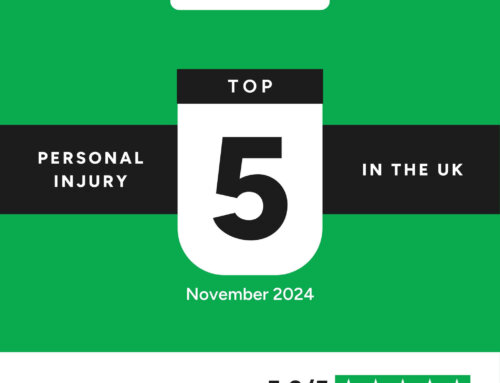We’ve already written a few articles on the Mooneerams blog about the whiplash reforms: (Can I still make a whiplash injury claim? and What are the whiplash reforms and why do we need them?) We’ve also covered the topic for Legal News Wales.
To refresh your memory, for many years now, the Ministry of Justice (MoJ) and the MIB (Motor Insurers Bureau) have been working hand in hand with the insurance industry to:
‘reform the way low value personal injury claims arising from road Traffic Accidents (RTA) are managed’
In case the public were underwhelmed by that statement, here is a sweetener, plucked from the MIB website:
‘Taken together, the reforms will reduce insurance costs for ordinary motorists by tackling the continuing high number and cost of whiplash claims’
The insurance industry has, over the last 10 years, been using its considerable voice and influence to drive lots of changes in the way that road traffic accident compensation claims are dealt with.
Each change that they have sought to push through into legislation has been detrimental to would be personal injury claimants. On each occasion, the ‘dangled carrot’, to get the general public onside, has come in the form of promises of:
‘reducing costs for ordinary motorists’
All the public has to do is buy into whatever personal injury ‘reforms’ the insurers are intent on making. It makes it easier for the insurers to sell the idea to the government if they have the public on their side.
There have been plenty of reforms (successful attacks), so just as a straw poll, let’s have a quick show of hands if you have seen your motor insurance premiums plummeting over the past few years?
No?
Some reduction in premiums, then?
Ok, we’ll take that as a ‘no’ too.
When are the whiplash reforms due to come in?
Up until the 11th January, they were due to go live on April 6th, 2021 after a number of false dawns, partly caused by the Covid19 pandemic, but in no small part because the MOJ hasn’t got down to setting out by means of rules and tariffs, how much people will actually get for a whiplash claim or rules, guidelines and protocols as to how claimants in person will deal with their own claims through an online website (portal).
However, on the 11th January, it was announced in the Law Gazette, that the reforms were to be delayed again – by a month. This means that at the time of writing, the reforms will be ‘coming – ready or not’ in May 2021.
Will I have to do my own whiplash claim then?
Yes, that’s right, you will be expected to do your present your own whiplash injury claims, instead of using a solicitor. However, the website isn’t ready to go live, so they can’t yet tell how that will operate and they haven’t fixed the guidelines to tell you, step by step, how you will do the claim.
But it’s less than 4 months until May 7th – how can they change the system so much without giving the public an idea of how it will work?
It isn’t just you that doesn’t know how it will work. Insurance company employees have no idea either and they are the people that will be on the other side to you in your claim. the reality is that they aren’t giving you, the insurers or claimant solicitors enough time to take in all the information that will be needed to make this work – whatever ‘this’ turns out to be.
Surely the MIB, MOJ or whoever is in charge of this should have published the rules by now?
You would have thought so. However, there is a thought that they may not even have decided on the rules yet. We just don’t know.
Is anyone making any noise about this?
It’s not something that you will find much about in the mainstream news outlets, that’s for sure.
However, an article in the Law Gazette on the 6th January revealed that the insurance industry seems to be starting to get twitchy about the prospect of the reforms not actually going live this year. A representative of the Zurich Insurance company was quoted as saying:
‘It is absolutely critical that when the new process is introduced, it must work fast and seamlessly for unrepresented claimants.’
The main concern from the Zurich representative seemed to be that if it the new system doesn’t work:
‘unrepresented claimants will be driven ‘into the hands of claims management companies who will take a cut of the pay-out.’
We agree with him on that, but then our view has always been that the whiplash reforms were likely to be welcomed with open arms by CMCs, because if personal injury solicitors were going to be forced out of being able to help whiplash injury claimants, claims companies would step in to fill the breach, working on a straight percentage of damages i.e., by taking, say, a 50% cut of any whiplash compensation that claimant in person, recovers.
Will the extra month’s delay, recently announced by the Lord Chancellor make any difference to how well the new system will work in May 2021?
It is difficult to see what can be achieved in an extra month. If a senior insurance representative felt sufficiently concerned less than a week before the announcement of this latest delay, to voice his concerns about ensuring that the new process works fast seamlessly, he is unlikely to have been a lone wolf amongst his senior insurance industry peers.
It also seems likely that those fears were being voiced because those in the insurance industry are as much in the dark as to how advanced ‘the process’ is, as we claimant solicitors are.
We may be wrong, but it is surely not beyond the pale, to wonder if the process isn’t that far advanced at all and that the extra month is needed because the majority of the work needed to get the whiplash reform programme fully up and running, still remains to be done!
An alternative view on whiplash injury claims and the reforms
- Whiplash injury claims have an undeserved reputation as being a charter for those who would make fraudulent claims. The insurers have never produced figures to show that the percentage of fraudulent whiplash claims is any higher than in other areas of insurance claims. In fact, what figures there are available suggest that there is a higher percentage of household insurance fraud, then there is of motor insurance fraud.
No one wants to see fraudulent claims. There are already robust anti-fraud measures in place and personal injury solicitors play their part in ensuring that any potential fraudulent claimants are flagged up at the earliest opportunity.
There is though, no doubt that some insurers have a tendency to overplay the ‘fraud’ card in relation to road traffic accident claims. Whiplash injury claims are an easy target for attack, particularly when there is a concerted campaign in the media, driven by some in the insurance industry, to vilify both people who make whiplash claims and personal injury solicitors.
- The numbers of road traffic accident claims and other personal injury claims have been consistently falling year on year.
As long ago as 2012, the Association of Personal Injury Lawyers (APIL) carried out a detailed survey which revealed that 40% of those who could make whiplash claims, don’t.
That doesn’t suggest that there is a huge whiplash claim problem. It doesn’t suggest that millions of people are jumping at the chance to make some quick cash or to present dodgy claims. In fact, it suggests the opposite – that there is nothing untoward in the numbers of whiplash claims being presented.
- Let’s not forget either the reason motor insurance exists. It is to pay out in the event of someone’s negligence causing an accident in which someone else suffers loss or injury. One often gets the impression that the insurance industry sometimes overlooks the reason why it exists.
- The reason that the whiplash reforms have not been implemented in practice yet, is because they are totally flawed in idea, principle and practice.
Yes, we are in the middle of a COVID-19 pandemic, but that hasn’t prevented the intended purposes of other government legislation being put into practice.
There has been ample time now for the insurers, the MOJ and the MIB to get their collective act together and come up with a fully working claims website (portal), to set out, agree and publish a new whiplash compensation tariff, to set out the regulations and rules surrounding the reforms in practice and to make all this public in time for the public, to learn how to use the website so as to be able to pursue their own whiplash claims.
- This lack of progress actually suggests that there is little ‘will’ left on the side of the MOJ and the insurers, to actually get this project done. There will be a few people within the insurance sector for whom this is a matter of dogma. However, overall, the sense is, of a project that is lacking in support from those whose idea it first was, in the first place.
What do we suggest should happen?
- The whiplash reforms should be scrapped.
- Injured victims of road traffic accidents will go uncompensated if the reforms are put into practice in the hotch-potch fashion that we be heading towards.
- They’ll go uncompensated even if proper rules and regulations and a working, fully understood portal are implemented.
- It’s time for the insurance industry to hold up its hands and accept that this was one reform idea too many.
- Instead, they could get on with dealing with claims more efficiently and settling claims faster. That has always been a problem for insurers. Get to grips with that and they’ll save the money that they want to.









